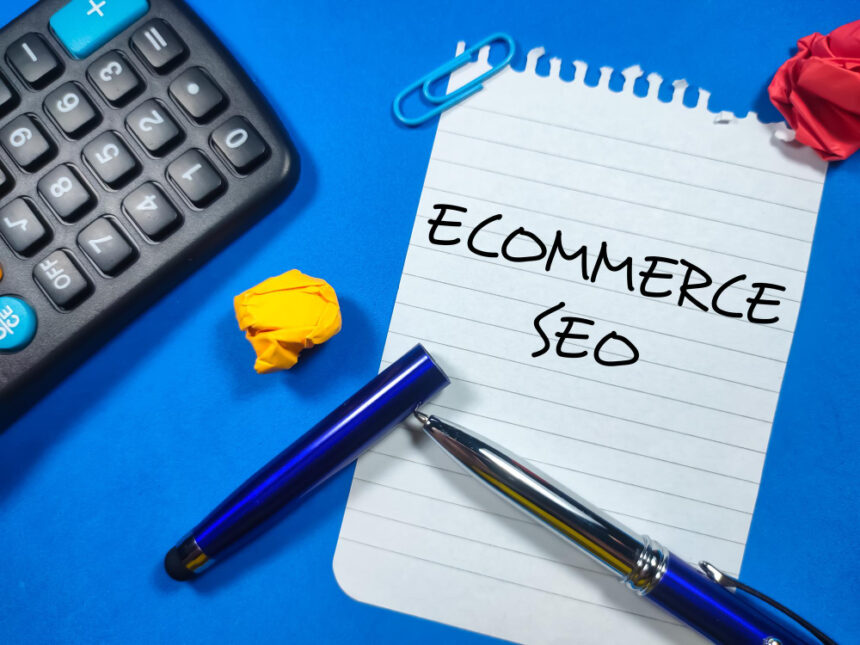In today’s digital world, the e-commerce industry is thriving. However, as the market becomes increasingly competitive, ensuring that your e-commerce store stands out on search engines is paramount. That’s where Ecommerce SEO services come into play. By optimizing your site for search engines, you improve your website’s visibility, attract more targeted traffic, and ultimately enhance your ROI.
Ecommerce SEO services are designed to fine-tune your website’s structure, content, and user experience to boost organic traffic and sales conversions. Whether you’re new to e-commerce or looking to refine your current strategies, this guide will walk you through the ten core features that Ecommerce SEO services offer to increase traffic and optimize your ROI.
What Are Ecommerce SEO Services?
Ecommerce SEO services focus on optimizing your e-commerce website so it ranks higher in search engine results pages (SERPs), leading to increased organic traffic. These services are not just about keyword integration, but also about creating a seamless user experience, optimizing site speed, and ensuring your online store is accessible across all devices.
Search engines like Google consider various factors when ranking websites, including the relevance and authority of the content, the structure of the site, and how well the site performs. Through Ecommerce SEO services, you can enhance these factors to ensure your website stands out, drives traffic, and converts visitors into loyal customers.
1. Comprehensive Keyword Research: Laying the Foundation for Success
At the heart of Ecommerce SEO services is comprehensive keyword research. Keywords form the foundation of your SEO strategy and influence almost every aspect of optimization. For e-commerce websites, identifying and using the right keywords is crucial for attracting the right audience.
Unlike traditional SEO, which focuses on broad terms, Ecommerce SEO emphasizes long-tail keywords—specific phrases that are more targeted and have lower competition. These keywords are particularly effective for e-commerce because they tend to reflect a user’s buying intent.
Effective keyword research involves finding keywords that strike a balance between search volume and competition. For example, instead of targeting a generic keyword like “shoes,” an e-commerce store might target “best running shoes for women” or “buy leather boots online.” These long-tail keywords are more specific and, although they may have lower search volume, they tend to attract users who are closer to making a purchase.
Incorporating these keywords into the product descriptions, meta descriptions, category pages, and blog content ensures that your e-commerce website ranks for terms that potential customers are actually searching for.
2. Optimized Product Pages: Converting Traffic into Sales
Your product pages are the primary touchpoint between your store and potential customers. If your product pages are not optimized, you risk losing customers at the final stage of the buying process. Ecommerce SEO services ensure that product pages are not only optimized for search engines but also tailored to improve conversion rates.
Product Descriptions and Content:
Each product page should have a detailed and unique description that provides all the necessary information a customer needs. By integrating the right keywords into these descriptions, you can increase visibility while also educating potential customers about the benefits of the product. A well-written product description can persuade a visitor to make a purchase, so it’s essential that it’s clear, concise, and SEO-friendly.
Product Images:
High-quality product images are vital for an e-commerce site. Not only do they help customers visualize the product, but they also contribute to SEO. Optimizing images by compressing file sizes without losing quality ensures faster page load times, which positively impacts user experience and SEO rankings.
Meta Tags:
Metadata—title tags and meta descriptions—are some of the first things search engines and users see when your product appears in the search results. Optimized meta tags for each product ensure that users understand exactly what they’ll find on the page. Using relevant keywords in these tags improves your chances of ranking higher for those terms.
3. Mobile Optimization: Meeting Customers Where They Are
Mobile traffic now accounts for a significant portion of e-commerce sales. Therefore, ensuring that your e-commerce site is mobile-friendly is no longer optional. Google also places a strong emphasis on mobile optimization in its ranking algorithms, making mobile-friendly sites a must for success.
Ecommerce SEO services focus on creating a responsive web design. This means that your site adjusts to different screen sizes and provides a smooth, user-friendly experience across all devices. Features like touch-friendly buttons, fast load times, and an easy-to-navigate layout are all part of a mobile-optimized website.
With more consumers shopping on smartphones and tablets, optimizing for mobile ensures that your site is accessible to a broader audience and increases the chances of conversions.
4. Site Speed Optimization: Reducing Bounce Rates and Improving User Experience
One of the most critical factors in both SEO and user experience is site speed. A slow-loading website can drastically hurt your rankings and increase bounce rates, as users are less likely to stay on a site that takes too long to load.
Ecommerce SEO services implement various strategies to optimize your site’s speed, including:
- Image Optimization: Large, unoptimized images can slow down your site. By compressing and resizing images, Ecommerce SEO services ensure that they load quickly without compromising on quality.
- Caching: Caching stores static content in the user’s browser so it doesn’t need to be reloaded every time they visit your site, leading to faster page load times.
- Code Minification: Minimizing JavaScript, CSS, and HTML files reduces the size of your web pages and improves load speeds.
A fast-loading site enhances the user experience, increases the likelihood of customers staying on your site longer, and improves your chances of conversion.
5. Structured Data Markup: Enhancing Your Visibility
Structured data, also known as schema markup, is a form of code that helps search engines understand the content on your website better. For e-commerce websites, using structured data allows you to display rich snippets on search results pages. These snippets could include product information such as pricing, availability, and reviews—details that can help your products stand out and attract more clicks.
Ecommerce SEO services help integrate structured data on product pages, category pages, and review sections. This not only makes your site more visible in search engines but also enhances your credibility by displaying additional information in the search results, leading to higher click-through rates.
6. SEO-Friendly URL Structure: Making It Easy for Search Engines to Crawl
URL structure plays a significant role in SEO. Ecommerce SEO services ensure that your website’s URLs are clean, descriptive, and organized. A logical URL structure helps both search engines and users understand what a page is about.
For example, a URL like www.example.com/running-shoes/women is both clear and SEO-friendly. It’s easy to read, contains relevant keywords, and clearly shows users the category they are browsing. On the other hand, a URL with random characters like www.example.com/123456 provides no information to either users or search engines.
A well-organized URL structure also makes it easier for search engines to crawl your website, improving your chances of ranking higher for relevant search queries.
7. Content Marketing Strategy: Building Authority and Attracting Traffic
While product pages are essential for driving sales, content marketing helps drive additional traffic and build brand authority. A robust content marketing strategy can help your website rank for keywords related to your products, answer customer questions, and establish your brand as an authority in your industry.
Ecommerce SEO services often involve creating high-quality blog content, including how-to guides, product comparisons, customer stories, and more. These content pieces not only help improve SEO by targeting additional long-tail keywords, but they also provide value to your audience, keeping them engaged and encouraging them to return to your site.
Creating regular, relevant content also helps you build backlinks, which can improve your site’s authority and overall SEO performance.
8. Link Building: Strengthening Your Website’s Authority
Link building is an essential component of any SEO strategy, and e-commerce businesses are no exception. High-quality backlinks from authoritative websites act as “votes” of confidence in your site’s relevance and trustworthiness, and they help improve your site’s rankings.
Ecommerce SEO services focus on securing backlinks through various strategies, including guest blogging, influencer partnerships, and content outreach. By obtaining backlinks from reputable sources, your website becomes more authoritative in the eyes of search engines, boosting its overall SEO ranking.
9. Conversion Rate Optimization (CRO): Turning Visitors into Customers
Attracting traffic to your website is just one part of the equation. The next step is converting that traffic into sales. Conversion rate optimization (CRO) is an essential part of Ecommerce SEO services, focusing on improving the elements of your website that influence buying decisions.
Key areas of CRO include optimizing the checkout process, making sure product descriptions are clear and persuasive, and improving the navigation to make it easier for users to find what they’re looking for. Ecommerce SEO services use analytics to identify where users drop off in the purchasing process and make improvements to maximize conversions.
10. Ongoing Analytics and Reporting: Tracking and Improving Your SEO Performance
Ecommerce SEO is an ongoing process. Once your website is optimized, it’s essential to track its performance and make adjustments based on data. Ecommerce SEO services include regular analytics and reporting to help you understand how your site is performing in terms of traffic, rankings, and conversions.
By analyzing key metrics like organic traffic, bounce rates, and conversion rates, Ecommerce SEO services can identify areas for improvement and make data-driven decisions to continue optimizing your site for better results.
The Path to E-Commerce Success with SEO
Investing in Ecommerce SEO services is crucial for any online store looking to thrive in today’s competitive e-commerce landscape. By focusing on keyword research, optimizing product pages, improving mobile functionality, and enhancing site speed, Ecommerce SEO services provide a comprehensive solution to improving traffic, conversion rates, and ROI.
When executed correctly, Ecommerce SEO creates long-lasting results that go beyond quick fixes, helping businesses grow their online presence and succeed in the digital marketplace. By applying the ten essential features outlined in this guide, your e-commerce business will be well-positioned to increase visibility, attract more customers, and ultimately maximize profits.

